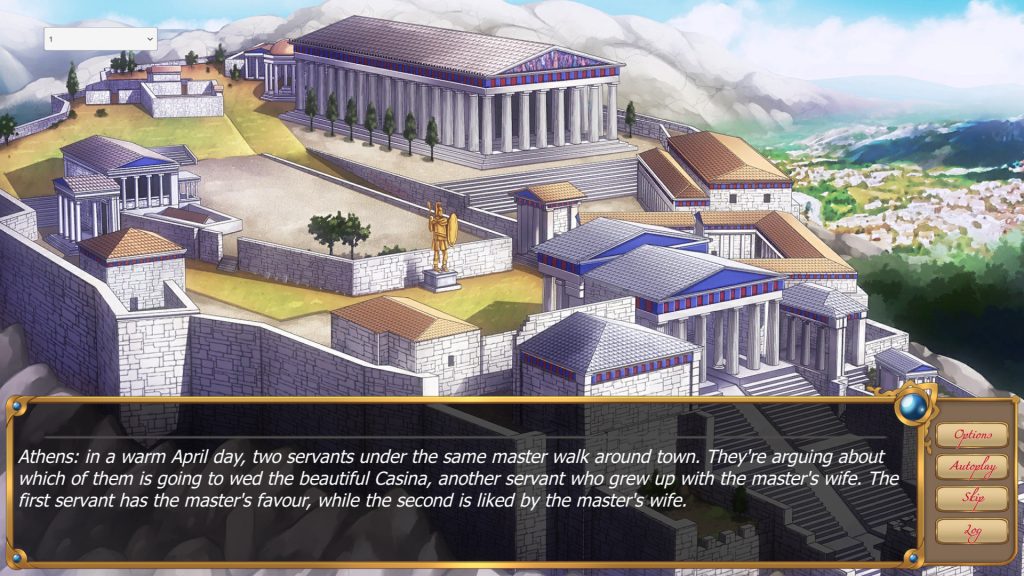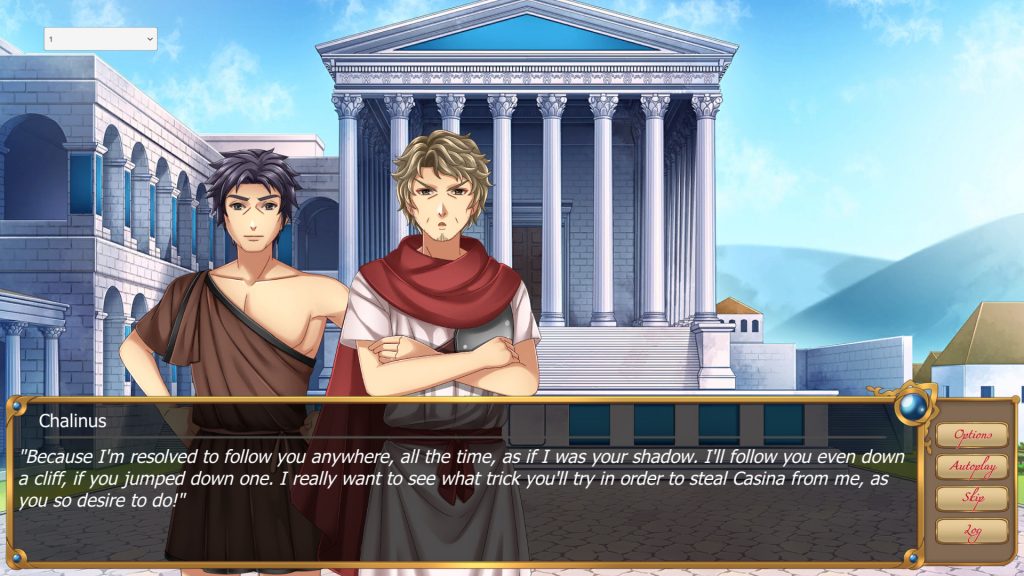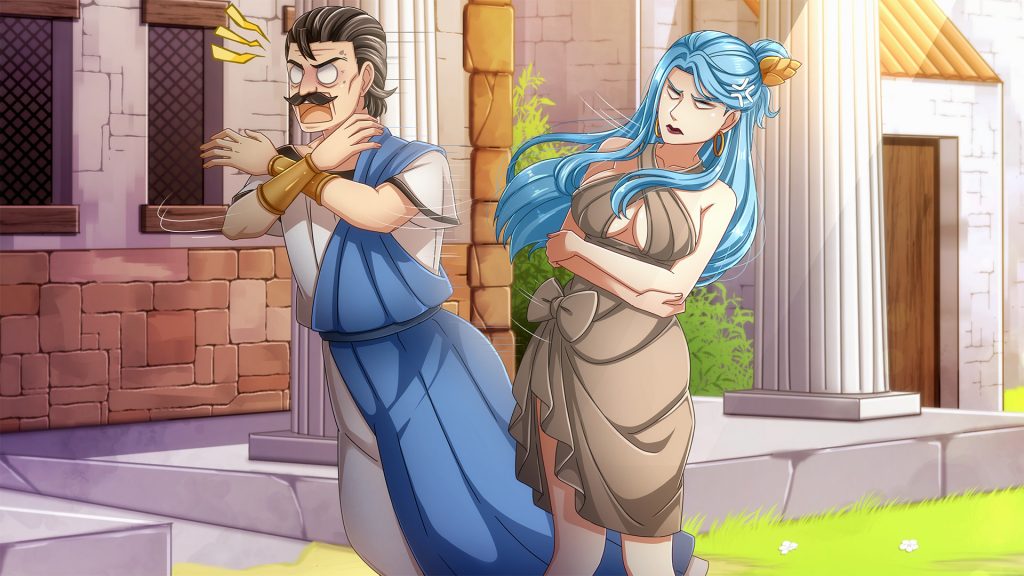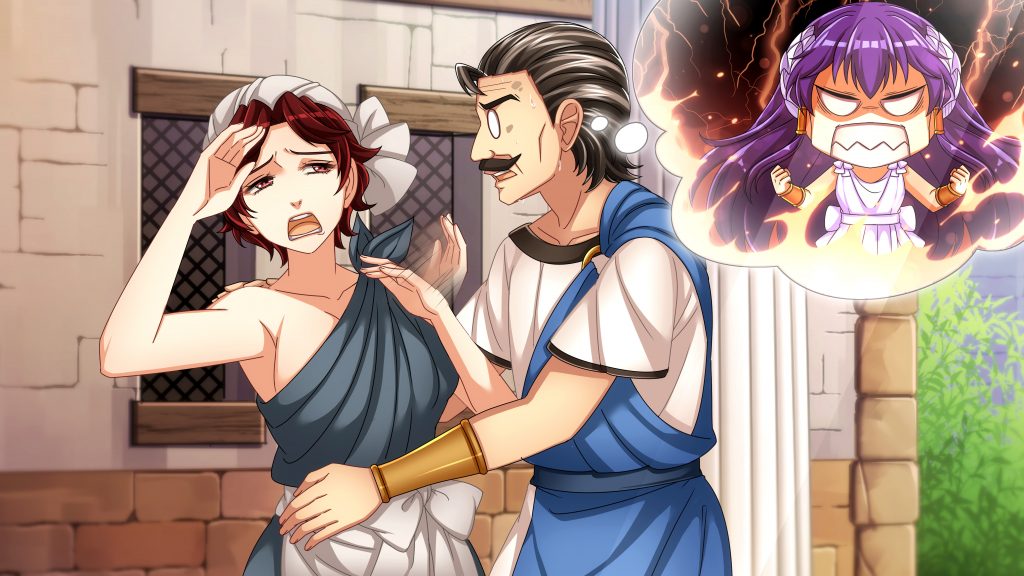Developed by Neoclassic Games, Casina is a modern interpretation of the classic Latin play by Roman playwright Plautus. Who will marry the lovely Casina, maid of an esteemed Athenian house? Cleostrata insists she be given to her slave Challius as a stand-in for a son that’s been temporarily sent to the country by his father and her husband Lisidamus. The scheming Lisidamus wants Casina for himself, you see, and insists she marry his servant Olympio instead so that he may keep her as a concubine. After drawing lots goes awry, neither side is willing to back down.
A demo for this game was previously reviewed, and we received a review copy of the full game.

From the perspective of turning a play into an interactive experience, they did a lot of things right. Sprite movement, their expressiveness, lip sync, extensive CG implementation, an orchestral score, and full voice acting work together to create something that genuinely feels similar to a theatrical experience. You can set it to autoplay and it’s a fairly pleasant watch. It’s an excellent-looking game with technically impressive art and high production quality. The colors are bright and fun with a modern style that can act as a good introductory entry point to classic literature.

The plot has some elements that, through a modern lens, have some problematic qualities, but with it not being original fiction, it’s more appropriate to judge the writing on its merits as an adaptation. Narratively, it’s pretty faithful. The characterizations are there, and it generally hits all the necessary major plot points in an elegant way. The alternate scenes and endings all fit well within the overall context of the story, and they’ve done an effective job at making an originally linear story into something with variations and room to play around. At a textual level, it’s not quite as smooth. Some lines and passages very clearly read as through they’re almost verbatim lines from the original play, while others are rewritten to varying degrees. The adapted lines have a weird marriage between classics-inspired language and modern verbiage that doesn’t really work. It creates stylistic inconsistency and causes the rhythm to keep dropping. I think they would have benefited from being a little more stringent in the overall diction they chose to implement while adapting.

Some of this weird hybridization also shows up in the art, especially the costume design for the female characters. With it being a “modern adaptation,” they would have had a lot of room to hyper-stylize and make some interesting design choices with the material. Instead they chose to stay with the classic setting, which is still great. Without purposefully trying to pick it apart, a cursory examination reveals fairly realistic architectural design. The men are in dress that at least vaguely implies historically accurate clothing, even if it’s highly simplified. Then you get to Cleostrata, and that disappears completely. Her dress is very modern, very sexualized, and she’s styled way differently than the other characters, bright blue hair and all. The smaller glimpses of Pardalisca, Casina, and Myrrhina all have similar problems. To me it’s very jarring, a little sexist, and disingenuous to her character. It’s inconsistent character design that also happens to be split along a gendered divide. It doesn’t make a log of sense.

There’s also a bit of a divorce between the written tone, the acting, and the depicted physical comedy. As a classic Latin play, the comedy’s a little drier and more reliant on a level of dramatic irony. They try to combine that with some slapstick, though, and I’m not convinced it really works together. Part of that’s also due to the way the acting was approached and implemented. It’s very stilted and highly presentational. This could have been turned to great stylistic use for the antique language, but nothing felt connected to each other, even on autoplay. It completely fails on the delivery and timing that comedy is so reliant on, so what we’re left with is something that’s, unfortunately, not very funny.
As a way to consume the original play in an easy, entertaining manner, Casina is great. At the same time, it feels like a very shallow interpretative work and lacks enough personal identity to be considered transformative. Overall, it feels like it’s halfway between multiple different ideas and none of them quite stick. I think it’s the perfect example of an excellent idea that could maybe have used better execution.







